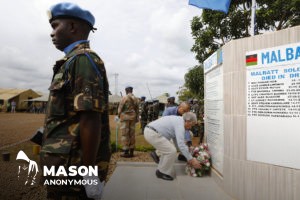Mr. Guterres was speaking at a press conference on Sunday, in the town of Beni, which is at the epicentre of the country’s deadly Ebola epidemic, where, he said, the people of the region are also facing other serious problems, such as measles, malaria and cholera, as well as insecurity.
Speaking in French, he said “I hope that my presence here today reaffirms my full support for MONUSCO, in the fight against armed groups who spread fear and death. MONUSCO, and its partners – the armed forces of RDC, and the Congolese national police – continue to work together to bring peace and security to the region”.
The UN chief went on express his condolences to the families, and loved ones, of the victims of violence, and called on all armed groups to immediately end their attacks on the civil population, and the security forces charged with protecting the Congolese people.
“The blue helmets have paid a heavy price in the service of peace. But this only strengthens our determination. We will do all that we can to put an end to the scourge of insecurity in this region. It is important that the people of Beni knows that we hear the cries of distress”.
United Nations system is determined to support the Congolese authorities, local communities and civil society actors, added Mr.Guterres, in the fight against insecurity, and that he will raise the subject with the national authorities in the capital, Kinshasa, on Monday.
The Secretary-General also visited the Mangina Ebola Treatment Centre on Sunday, where he expressed his admiration for the resilience of the community, and pointed out the central importance of security to tackling the disease.
“To fight Ebola, we need freedom of movement, we need access, we need security. And our solidarity must be expressed through increased cooperation between MONUSCO and the Armed Forces of the DRC, to do everything possible to demobilize local armed groups and to convince them to abandon the bush and to reintegrate into the society”.
And to do everything in this area, we need greater solidarity from the international community. The international community has responded well to our calls for funding. The pledges up to the end of the year are more or less in line with the need for Ebola control, but only 15% has been paid so far. That means there is a liquidity problem in the response, which is extremely serious. And when there is no cash, even if there are promises, the Ebola response stops.
And if we lose a week in the response to Ebola, we do not only lose a week: we can lose the war against Ebola.
The countries and organizations that have made financial commitments to support the Ebola response must, said Mr. Guterres, honour their promises, so that the response can continue, uninterrupted, in all affected areas.

